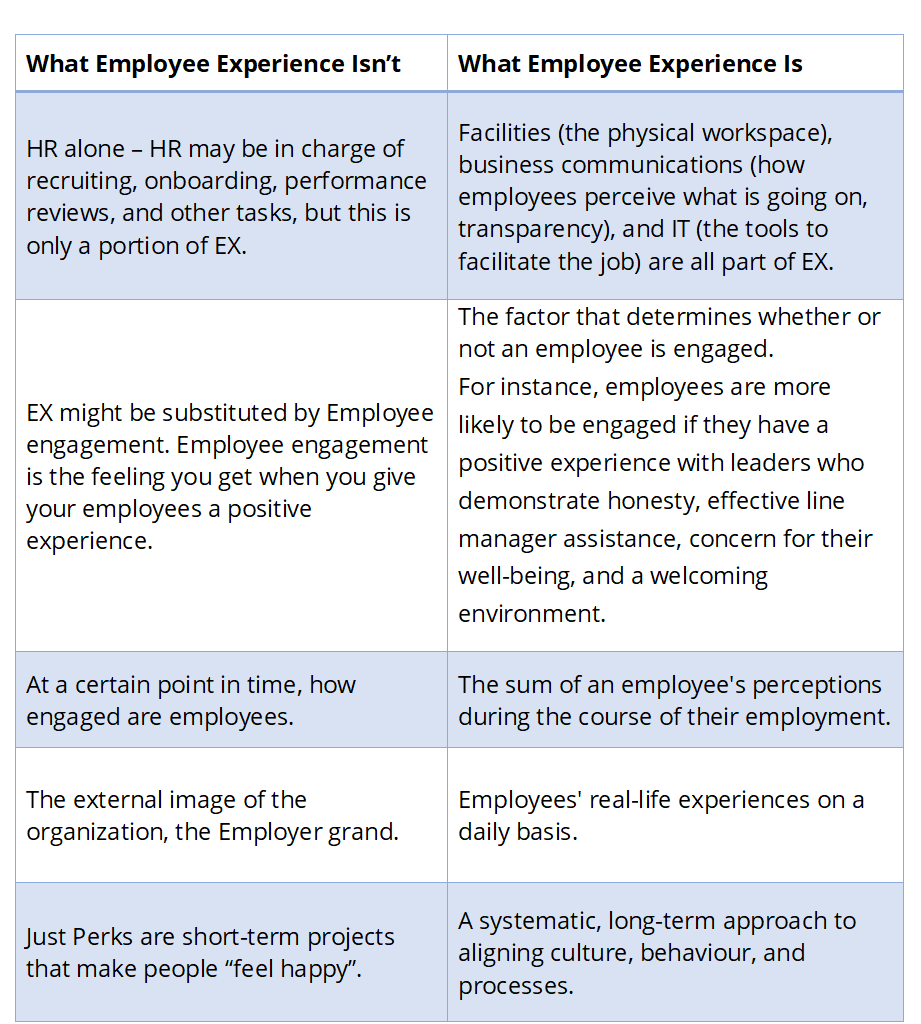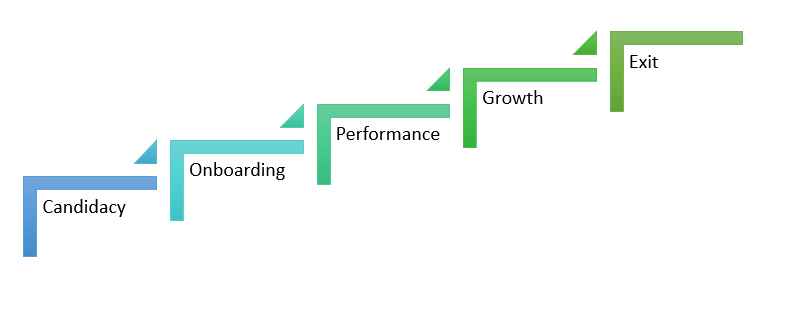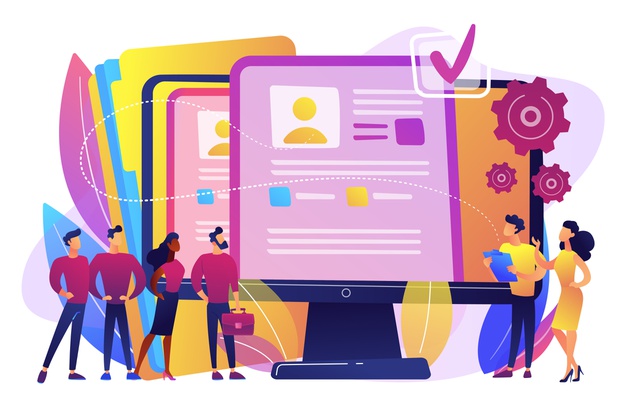Send Us a Message
Contact Information
Skizzle Technolabs India Pvt. Ltd.
Noel Focus, Kakkanad,
Kerala, India – 682021
Employee engagement is attractive, but it is only a temporary solution. Employee experience is a long-term solution that gets to the heart of the problem. So, let’s check what is employee experience all about? Is it merely jargon in the field of human resources? What is the difference between employee engagement and employee experience, and how can you ensure that your employees have a pleasant experience?

However, some people are perplexed by terminology. The distinction between employee experience and employee engagement is not always evident. While both are vital, there are significant disparities between them that must be addressed.
In this article let’s discuss more on the definitions of employee experience and employee engagement, their differences, and some tips on how to improve the employee experience. Read on.
Let’s begin with employee engagement;
Employee engagement can be interpreted in a variety of ways. The topic of employee engagement has piqued the interest of many HR and management thought leaders. Let’s take a look at what Engage for Success has to say about employee engagement since we believe their definition sums it up nicely:
“Employee engagement is a workplace approach resulting in the right conditions for all members of an organization to give of their best each day, committed to their organization’s goals and values, motivated to contribute to organizational success, with an enhanced sense of their own well-being.”
Employee engagement measurements tend to focus at a specific point in time — annually, monthly, or another time period — although the advantages of employee engagement are well-established.
Now let’s check about employee experience.
So, what is employee experience?
In 2017, the term “employee experience” became more prevalent. Employee experience (EX) differs from employee engagement in that it considers engagement at all touchpoints throughout the employee lifecycle from the employee’s perspective. It refers to a company’s physical, technological, and cultural environment.

As per Deloitte Insights,
“Starting as potential hires and recruits, employees look at everything that happens at work as an integrated experience that impacts daily life in and outside the workplace, including overall physical, emotional, professional, and financial well-being. Candidates assess future employers from the very start of the talent acquisition experience and make quick judgments about what life will be like for them in the organization, based on how they interact with the enterprise during the recruiting cycle.”
In other words, employee experience is a style of thinking about the organization that is centered on the employees. HR professionals and company leaders may ask this question, “How will our people perceive this?” and “How do we make an impact on our people if we act like this?” while making decisions based on employee experience.
Employee experience considers how employees perceive, hear, believe, and feel about their jobs in all aspects. These factors are present from the start of the hiring process to the last day of their employment with your organization.
To provide the best possible employee experience, a company must develop a culture in which leaders and managers alike put themselves in their employees’ shoes.
According to Olivier Dubuisson, “Employee Experience is the sum of the various perceptions employees have about their interactions with each domain of the organization in which they work.”
Employee experience and customer experience should be addressed collectively because an organization that only focuses on its employees will not survive. There should be no intentional disparities in how customers and employees view an organization’s behavior.

So, what exactly is the difference between employee engagement and employee experience? Simply said, employee experience is the input, while employee engagement is the desired outcome.
You will have more engaged employees if you improve your employees’ experience with your company. Employee engagement can be thought of as the end objective, whereas EX can be thought of as the means to that purpose.
The gap between employee experience and employee engagement is interpreted differently by Forbes. Employee engagement, they claim, is a top-down mentality. Employees are expected to choose to interact with the workplace culture, goal, and job. Employee experience, on the other hand, is a bottom-up approach in which the work environment and operations are tailored to the employees’ needs.
While employee engagement often focuses on the workplace and productivity, employee experience also includes the worker as a human being, according to another source. When it comes to employee experience, all definitions agree that the focus should be on the employee rather than the organization.
We need to look at the employee experience journey to properly grasp the definition of “employee experience.”
The employee experience journey considers the EX at each step of the employee lifecycle. The goal of evaluating the EX journey is to ensure that employees are engaged throughout the process, from recruitment to onboarding, performance, growth, and exit. Employee experience deteriorates as a result of disengagement at any level.

At each point of the employee experience journey, we can ask many employee-centric questions.
For instance, throughout the candidacy process, we might think about:
During onboarding, we can ask:
Now, at the performance stage, we might ask:
We might think about some of the same characteristics of EX differently during the “growth” stage:
Finally, during the “exit” phase:
There are numerous reasons for today’s greater emphasis on employee experience. Companies, for example, are attempting to address the skill shortage and retain their employees. Another key thing to consider is social media’s influence when it comes to recruitment and retention.
Your company’s employee experience is unlikely to remain a closely guarded secret. Depending on the efforts you’ve made for your people, this can be a good thing or a terrible thing. Your employees are likely to post their opinions about your company on the internet. Glowing recommendations can draw top performers to your door, while blistering employer reviews on Glassdoor can rapidly capture a prospective employee’s attention.
Companies should not underestimate the harm that a publicized bad employee experience can cause. Widely published tales have harmed the employer brands of Amazon, Sports Direct, and even Google.
Furthermore, employees nowadays have a lot of options and are consequently pickier. They are actively looking for employers who are concerned about their employees’ well-being. Employees, according to Gallup, want to work for firms that provide them with opportunities to improve while also offering them meaning and purpose.
Internally, disengagement can result from a negative employee experience at any point in the lifecycle. Increased absence, reduced productivity, increased accidents, and employee churn is among the other established consequences.
Now that you understand the value of a positive employee experience, how can you provide a motivating EX?
Here are a few pointers to keep in mind:
Employee experience management will continue to grow in popularity as time goes on. Employers are likely to grow more cognizant of the influence employee experience has on their bottom line. As they construct a more meaningful EX lifespan, they will also initiate both short-term engagement initiatives and longer-term EX strategies. Employee experience is likely to be poor and short-lived without employee engagement throughout the life cycle.
We’ve previously seen larger companies take employee experience seriously, such as when Airbnb’s Chief Human Resources Officer was promoted to Chief Employee Experience Officer. On LinkedIn, the number of professionals with “Employee Experience” in their job titles has risen from 838 to 1644 at a rate of 96%.
We expect this tendency to continue, resulting in happier, more productive, and engaged employees in the future.

High-performing teams are the distinctive feature of an industry-leading business. This can ensure the business's success in the long run. Working in a team...
Read More
Since the pandemic hit the world, the new normal is working from home. Gen Y and Gen Z are the largest workforce units of...
Read More
You have much to consider when looking for a solution for human resources (HR) technology. What is the right fit for you? How are...
Read More
As we have seen human resources and information technology have become more intertwined during the last decade. Manufacturing, financials, sales and marketing, and supply...
Read MoreSkizzle Technolabs India Pvt. Ltd.
Noel Focus, Kakkanad,
Kerala, India – 682021